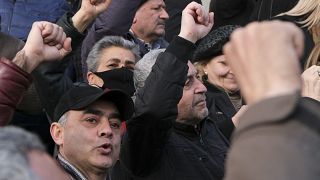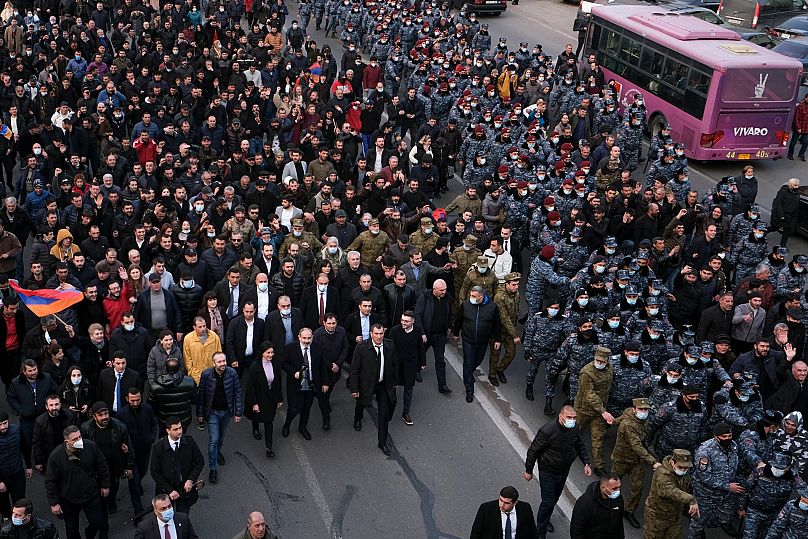Flanked by thousands of his supporters, the Armenian Prime Minister on Thursday marched through the streets of Yerevan in a bid to rally people behind him after claiming the army had attempted a coup.

MOpposition demonstrators rally to pressure Armenian Prime Minister Nikol Pashinyan to resign in the center of Yerevan, Armenia. Feb. 25, 2021. – Copyright Hrant Khachatryan/PAN Phot
While Nikol Pashinyan’s advocates came out in Republic Square in the heart of the Armenian capital, throngs of opposition protesters also convened in the city, bringing traffic to a halt and chanting “Nikol, resign!”

Armenian PM Nikol Pashinyan (centre front left carrying a megaphone) walks with his supporters in the centre
The catalyst for the recent unrest in Armenia is last year’s bloody conflict with Azerbaijan over the Nagorno Karabakh region, which saw thousands killed on both sides.
Swathes of territory in and around the mountainous region were ceded to Azerbaijan when the two sides signed a November 10 Russian-brokered peace deal and Pashinyan has faced protests ever since.
This week’s unrest centres around a “reckoning on Armenia’s perceived failings in that conflict and who is responsible,” associate fellow on the Russia and Eurasia Programme at Chatham House, Laurence Broers, told Euronews.
The importance of the Nagorno Karabakh region to Armenia and Azerbaijan should not be underestimated.
“This is an issue of identity for both sides,” Dr Kevork Oskanian, Honorary Research Fellow at Birmingham University, who specialises in Eurasian politics, told Euronews.
“Nagorno-Karabakh is central to the identity of both Armenians and Azerbaijanis — it is very hard to compromise when it’s about such a deep-held part of your identity.”
Who are the key players?
Oskanian observes there are “two camps now ranged against each other” in Armenia.
“The opposition camp, Pashinyan, basically taking his supporters into the streets, and the army in between,” he said.
Prime Minister Nikol Pashinyan: Since taking office, Pashinyan has faltered, making a series of mistakes and missteps, observed Richard Giragosian, director of the Regional Studies Center think tank in Yerevan.
The leader of the “My Step” was massively popular two years ago, winning the elections in 2018 with a landslide result of over 70%, but recent polls have shown this score has dramatically slumped to around 45%.
Anti-government sentiment has surged since the November conflict, with Pashinyan’s critics criticising him for “losing the war”, according to Oskanian, and “as the losing side, he has to resign”.
The opposition: There have been ongoing opposition protests since a November 9 ceasefire in Nagorno Karabakh, spearheaded by a group of 17 opposition parties, all but one of which are not in parliament,
